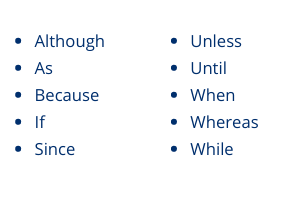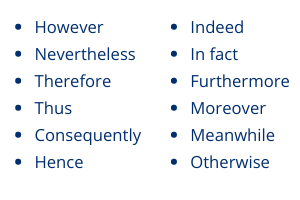There are three main types of conjunctions in English. Some words in different categories have identical meanings, but they have different grammatical functions. As a result, they are punctuated differently when used to begin a clause or sentence.
Although the conjunctions discussed below may also appear in the middle or at the end of a sentence in certain contexts, this post concerns their placement at the start of a sentence or clause only.
1) Coordinating Conjunctions (“FANBOYS”)
There are seven coordinating conjunctions, known collectively by the acronym FANBOYS:

These words are placed in the middle of a sentence to join two independent clauses and should follow a comma. Although the punctuation is often omitted in everyday writing, you should make an effort to use it because the comma serves to clearly separate the parts of the sentence and helps the reader follow your ideas more easily.
Correct: Gene-editing technologies have enormous potential to improve people’s lives, but they also come with many serious risks.
Avoid: Gene-editing technologies have enormous potential to improve people’s lives but they also come with many serious risks.
Note, however, that if a subject does not appear in the second clause, the comma is unnecessary. On the SAT and ACT, this construction is considered incorrect; in IELTS/GRE/GMAT essays, and in real life, things are more flexible. The comma can be used to separate thoughts when a sentence is very long, or for stylistic effect. That said, when sentences are short are straightforward, the comma is generally unnecessary.
Correct: Gene-editing technologies have enormous potential to improve people’s lives but also come with many serious risks.
Iffy: Gene-editing technologies have enormous potential to improve people’s lives, but also come come with many serious risks.
In addition, you should not place a comma after a FANBOYS conjunction.
Incorrect: Gene-editing technologies have enormous potential to improve people’s lives, but, they also come come with many serious risks.
Occasionally, and primarily in journalistic or informal writing, FANBOYS conjunctions may be used at the beginning of a sentence (following a period/full stop) for emphasis, but in formal writing, this use should typically be avoided.
Avoid: Gene-editing technologies have enormous potential to improve people’s lives. But they come with many serious risks.
2) Subordinating Conjunctions
These conjunctions join dependent clauses (fragments) and independent. They can be placed either at the beginning of an entire sentence, or at the beginning of a clause in the middle of a sentence.

When the clause begun by a subordinating conjunction comes first, a comma must be placed at the end, before the independent clause.
Correct: Although gene-editing technologies have enormous potential to improve people’s lives, they come with many serious risks.
Incorrect: Although gene-editing technologies have enormous potential to improve people’s lives they come with many serious risks.
If the independent clause comes first, a comma is typically used before certain “strong” conjunctions, e.g., (al)though, whereas, and while (as a synonym for whereas).
If a sentence is long and complex, it may make sense to place a comma before another conjunction, e.g. since or unless. If a sentence is short and straightforward, however, the comma is unnecessary.
Correct: Gene-editing technologies have enormous potential to improve people’s lives, although they come with many serious risks.
Correct: Gene-editing technologies come with many serious risks because they allow scientists to manipulate the fundamental building blocks of life.
Avoid: Gene-editing technologies come with many serious risks, because they allow scientists to manipulate the fundamental building blocks of life.
Remember that a single clause begun by a subordinating conjunction is always dependent—it cannot stand on its own as a complete sentence, and should not follow a period/full stop.
In addition, you should not place a comma after a subordinating conjunction.
Incorrect: Gene-editing technologies have enormous potential to improve people’s lives. Although, they come with many serious risks.
3) Conjunctive Adverbs
When conjunctive adverbs are placed at the beginning of a clause or sentence, they must follow a period (full stop) or semicolon. Although they are followed by a comma, they cannot follow a comma.

Correct: Gene-editing technologies have enormous potential to improve people’s lives. However, they come with many serious risks.
Correct: Gene-editing technologies have enormous potential to improve people’s lives; however, they come with many serious risks.
Incorrect: Gene-editing technologies have enormous potential to improve people’s lives, however, they come with many serious risks.
And an example with therefore:
Correct: Gene-editing technologies come with very serious risks. Therefore, they must be carefully regulated.
Correct: Gene-editing technologies come with very serious risks; therefore, they must be carefully regulated.
Incorrect: Gene-editing technologies come with very serious risks, therefore, they must be carefully regulated.